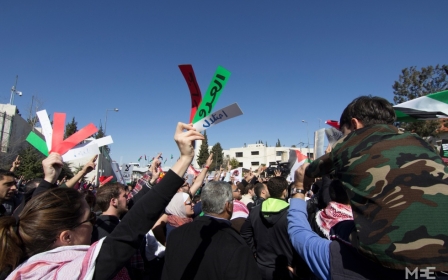Palestinian company calls off $1.2bn Israeli gas deal

A Palestinian company has called off a $1.2bn deal that would have seen Israeli gas supplied to the occupied territories for the next 20 years, according to a letter filed with the Tel Aviv Stock Exchange on Wednesday.
The termination of the deal, seen as a keystone in a series of potential deals between partners in Israel's largest offshore gas field and neighbouring countries, including Egypt and Jordan, has the potential to shake up the booming Eastern Mediterranean gas market.
The Palestinian Power Generation Company (PPGC) gave notice to US-based Noble Energy and three Israeli companies – Avner Oil, Delek Drilling and Ratio Oil Exploration - on Monday that their deal, signed last January, was off, according to the filed letter.
In a statement released to local media at the end of February, Palestinian officials indicated that PPGC had decided last summer to cancel the deal and said that government authority would have been required.
It appears, however, that PPGC only officially cancelled the deal on Monday, according to a letter which Delek Drilling filed with the Tel Aviv Stock Exchange and Israel Securities Authority on Wednesday.
As a publicly traded company, Delek and other partners in Israel’s Leviathan offshore gas field are required by law to disclose significant business developments to their shareholders and public authorities.
The cancellation of the deal comes several weeks after Palestinian civil society leaders and politicians called, during a press conference in Ramallah, on the Palestinian Authority to pull its backing from the deal.
Mahmoud Nawajaa, the general coordinator of the Palestinian Boycott, Divestment and Sanctions (BDS) National Commitee, told Middle East Eye on Wednesday that as far as his group knew, PPGC had not cancelled the deal prior to the 17 February BDS press conference.
"Regardless, what we care about now is that Palestinian public's opposition to any gas deal with Israel was strongly voiced and that the company has retreated from a disastrous and strategic mistake," Nawajaa said.
Delek's letter appears to focus the blame for the deal’s cancellation on Israel’s Antitrust Authority - a independent commission - which announced in late December that it might designate Noble Energy and Delek Drilling’s ownership of the Leviathan field as a cartel and petition their ownership to be reorganised.
An official decision has yet to be announced and is expected to come once a government is formed following Israel's 17 March elections.
The termination of the PPGC deal will take effect within 30 days unless approval from the Antitrust Authority is received within that time or unless other unstated conditions set forth in the original deal are fulfilled, according to the letter.
Shaky deals?
Several potential Leviathan gas deals would appear to hang in the balance with the Authority's decision, including letters of intent signed with neighbouring Jordan and Egypt which have yet to result in final agreements.
“There is no real connection – each contract is not dependent on the other, but it might encourage the other groups to follow the same route," Amiram Barkat, a journalist with Israel's Globes business daily, told MEE on Wednesday.
Last June, Leviathan partners and BG International Limited, a subsidiary of BG Group, signed a letter of intent to supply natural gas from the massive Leviathan field to a BG facility in Egypt over the course of 15 years.
Then just last week, in a separate deal, BP announced that it was launching a multi-billion dollar gas exploration project in Egypt.
Although no announcement was made, Barkat said some had interpreted BP's announcement as a sign that BG will eventually withdraw from June's letter of intent.
"Of course, it also depends on the question of whether they will find any new gas fields," he said.
Last September, the Leviathan partners signed a letter of intent to supply Jordan's National Electric Power Company with gas for 15 years in a contract thought to be worth between $14 - $15 bn.
In December, a majority of Jordanian parliamentarians voted against the deal, but because their vote was non-binding, the government can move forward with the deal.
Protests against the agreement, which started late last year, continued with thousands of Jordanians taking to Amman's streets last week to reject the deal.
An Antitrust Authority decision that the Leviathan partners have a monopoly on Israel's largest offshore gas field could result in a legal process that might take years, Barkat said.
“This is something that both parties desperately want to avoid. They realise it’s not in their interests, either entrepreneurs or the government," he said.
“So they will do their best to reach some kind of compromise, but it seems that it’s very hard to find common ground between all of the different regulators and the developers. The gap seems to be quite substantial.”
The shaky ground on which the deals stand will likely irk US officials who have pushed the gas deals as a potential stabilising force for the region - and were involved in initial meetings between Noble Energy and Jordanian officials.
“It can be an opportunity for bolstering security and enhancing prosperity for all those operating in these areas,” Amos Hochstein, the US State Department’s special envoy for international energy affairs, told Globes in January.
“There is so much potential here that it would be a pity to let it get away. There’s a short window of opportunity here and we want to support it,” Hochstein said.
Stay informed with MEE's newsletters
Sign up to get the latest alerts, insights and analysis, starting with Turkey Unpacked
Middle East Eye delivers independent and unrivalled coverage and analysis of the Middle East, North Africa and beyond. To learn more about republishing this content and the associated fees, please fill out this form. More about MEE can be found here.




